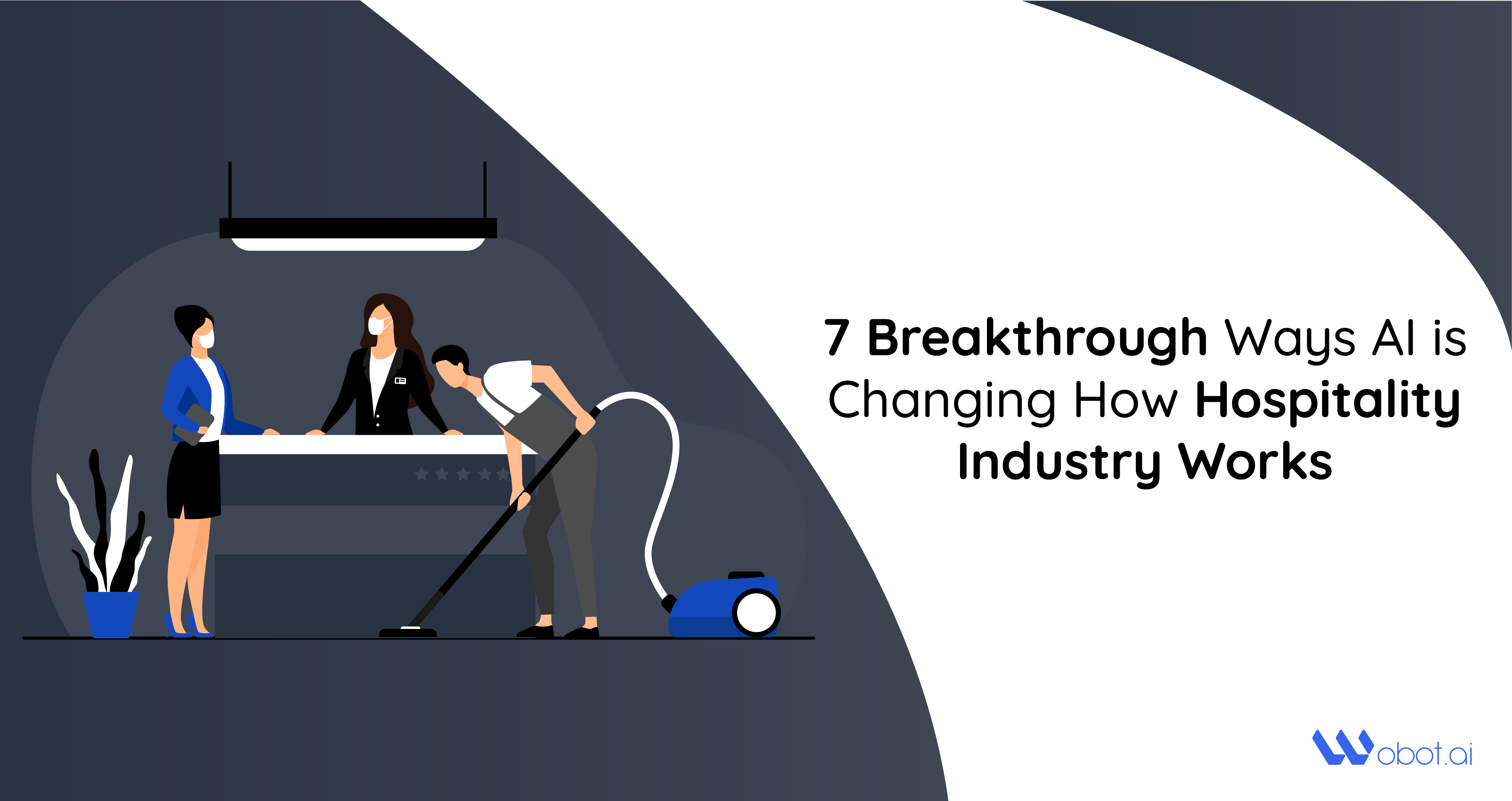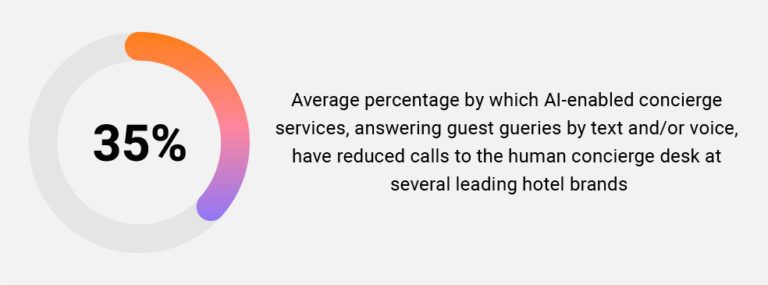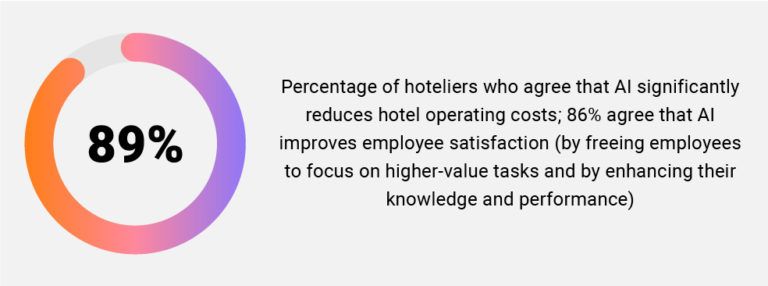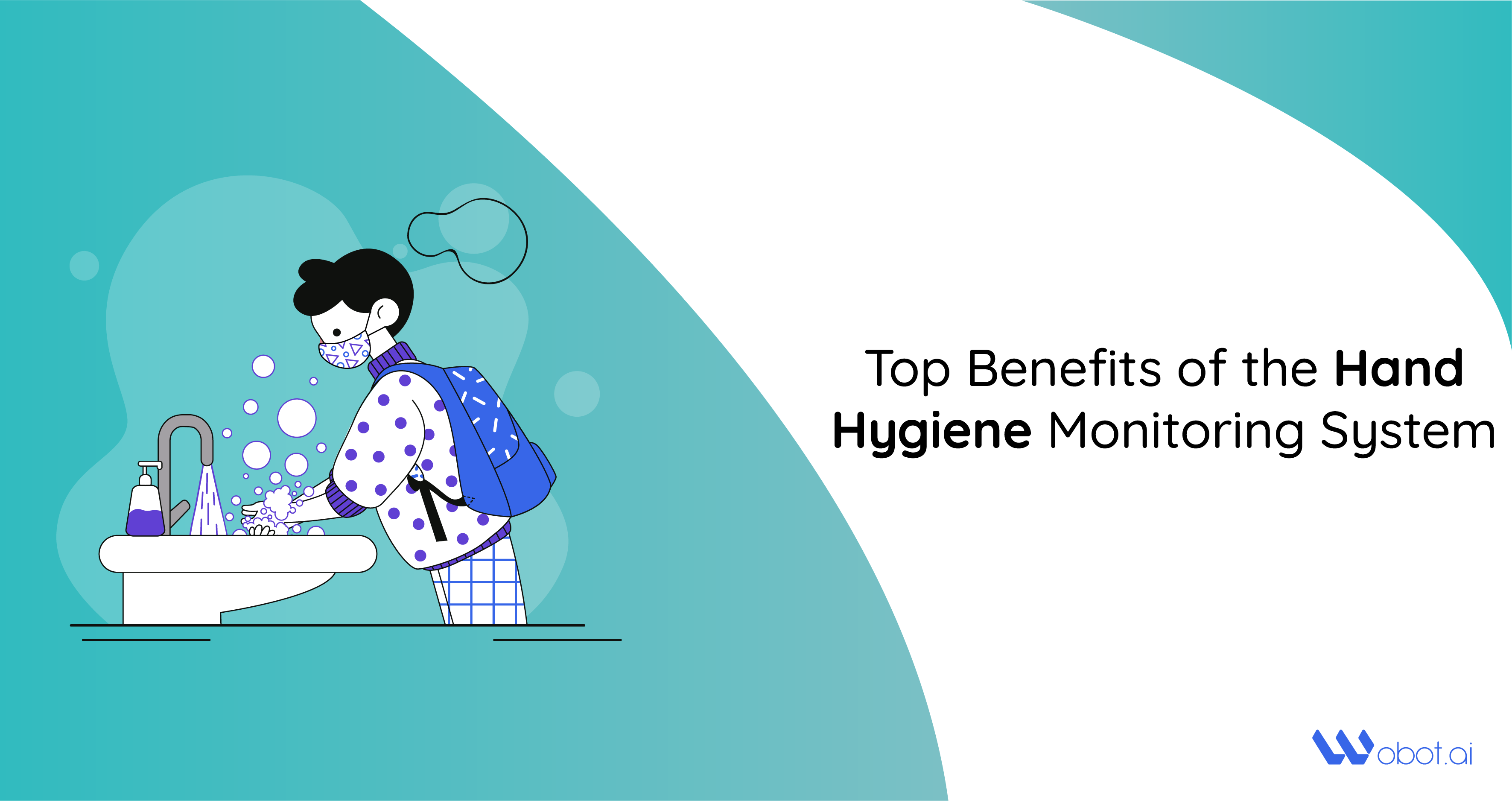7 Breakthrough Ways AI is Changing How the Hospitality Industry Works
Written by Team Wobot

Table of Contents
Introduction
As travel picks up pace again, existing business processes need redefining so that they can meet guest preferences, deliver memorable travel experiences, and improve customer loyalty.
The last few decades have seen incredible innovations and breakthroughs in the technological landscape. One such innovation is Artificial Intelligence. The Travel and Hospitality industry is adopting Artificial Intelligence (AI) and Machine Learning (ML) in their day-to-day operations to personalize customer service.
With the increase in customer data, combined with advancements in technology, AI can be used for various functions ranging from customer service to revenue management, staff assistance, and even direct messaging.
AI has the powerful potential of offering valuable insights that have not been experienced before. It also gives hospitality businesses the perfect opportunity to enhance customer service, which increases customer loyalty, translating into tangible revenue gains.
We can safely say that AI is already revolutionizing how the hospitality industry works. In this blog, we will look closer at some of its applications and their benefits.
Importance of AI in the Hospitality Industry
Customer service is one of the most important parts of the hospitality industry. It can make or break any business. With the increase in competition, hospitality businesses must differentiate themselves from other brands. However, this differentiation can happen only with unparalleled customer service while keeping guest preferences in mind. This is where AI becomes incredibly important in the hospitality industry. With AI, how customer service can be improved is endless, ranging from increased personalization to tailored recommendations to better time management.
Also, something that makes AI significant is its ability to carry out human-based functions at any time of the day. This helps businesses in minimizing manual errors, free up their resources, and deliver better service.
The following section will look at the various real-life applications of AI that businesses in the hospitality industry have adopted to improve their processes.
Application of AI in Travel and Hospitality Industry
1. Chatbots and Messaging
Chatbots are among the most common methods businesses in the hospitality industry can use for direct messaging, online chat services, reservations, and responding to simple questions and requests. These chatbots have been used by businesses across various industries to give their prospective customers an instant response and reduce their wait-time at any time of the day and week. As a result, such technology becomes invaluable to businesses as it reduces the response time to the levels that are difficult to achieve in human-to-human interactions.
2. Video Intelligence
Another way many businesses are using AI in the hospitality industry is through video intelligence. With the help of AI-powered cameras, businesses can understand their footfall, customer engagement metrics, security practices and optimize their workforce, all in real-time. When cameras become smart, the captured videos are able to provide insights that can help businesses in better decision-making.
For example, with customer and employee density heatmaps, businesses can compare workforce positioning with customer density. These insights are beneficial in optimizing both employee scheduling and positioning. With this, businesses can position their employees in different areas at the right time based on customer density.
The travel and hospitality industry can also use AI-powered cameras to maintain cleanliness, hygiene, sanitization, safety, and security in their premises.
3. AI-powered Concierges
In-person customer service is being delivered by Robots or AI-powered concierges in many hospitality businesses nowadays. These robots can efficiently deal with basic customer-facing situations. Along with making the customer experience memorable, these robots provide a competitive edge over similar businesses.

One of the great examples here is Dash, an AI-powered Robot adopted by Crown Plaza at its San Jose, Silicon Valley location. Dash, can deliver snacks, toiletries, and other hotel amenities to guests. When called for, Dash makes its way through the hotel using a unique WiFi connection. It can monitor its power usage and return to its charging point when needed. The best part is the fact that it can also make a phone call to announce its arrival.
4. Data Analysis
Hospitality businesses are also using AI for data analysis. AI can help them sort through large amounts of data and draw meaningful conclusions about current and prospective customers.
This data is collected through various channels such as surveys, online reviews, social media, and loyalty programs to draw meaningful conclusions about the business’s overall performance.
For example, an AI-powered booking engine gathers data every time a guest interacts with the hotel’s website. Then this data is analyzed to learn more about the customer and offer them the most relevant prices.
5. Staff Assistance
There are many people employed in the hospitality industry in front and back-of-house operations—some of the guest-facing staff work at the front desk, in housekeeping, and as concierges.

These employees use Point of Sale (PoS) systems through which AI can be incorporated to enhance the guest experience. PoS systems offer the functionality of real-time booking, confirmation, and tracking. Here, AI can make real-time recommendations by analyzing spending patterns and guest preferences.
AI can also help reduce staff workload by handling mundane tasks such as answering frequently asked questions freeing the employees to focus on higher-value tasks that challenge their learning and improve their performance.
6. Loyalty and Sentiment Analysis
Social media usage is increasing day by day. Customers use various social media channels to express their feelings and experiences. Using AI, hospitality businesses can understand which loyalty program features attract customers and which do not work.
Sentiment analysis analyzes emotional behavior. Every statement a guest posts on any platform is considered for sentiment analysis. These statements could be categorized into positive, negative, and neutral views. Based on these insights, businesses can create personalized smart videos about new offers, tips, and recommendations to send to their guests. They can also understand their reputation in the market, areas of improvement, and other well-performing aspects.
7. Revenue Management
A Revenue Management System helps optimize the revenue travel and hospitality businesses receive from each guest by employing strategies to capture the maximum value a guest can spend.
When revenue management systems work with AI, businesses can more accurately predict demand and analyze customer behavior patterns. Not only that, but it also helps in automatically updating the prices across all channels and consolidates piles of data from multiple sources, which lets businesses reap the benefits of maximized revenue with no human intervention.
The applications of AI in the hospitality industry are endless, and so is its potential. By combining AI in daily processes, the travel and hospitality industry can ensure personalized service, better value, and memorable guest experiences.
Conclusion
Good experiences are the driving force behind customer revisits. Therefore, to enhance customer experience, travel and hospitality businesses are moving towards AI-powered technologies at a fast speed.
With AI, businesses can efficiently handle day-to-day processes, reducing strain on employees while improving guest satisfaction, all in a way that complements and enhances existing processes. Also, the complementary nature of AI helps enhance the employees’ knowledge, performance, and speed. Therefore, when AI and employees work together, it can be advantageous to the employees, the customers, and the business.
AI is changing the guest experience at many stages of the travel lifecycle. This transformation will only accelerate over the next few years, making the future of hospitality guest experience better day by day.
Learn to identify, analyze and mitigate process deviations in real-time with video intelligence.
P.S. You’re signing up for value here. No spam. No overly promotional emails.
Table of Contents
Related Blogs
See All
